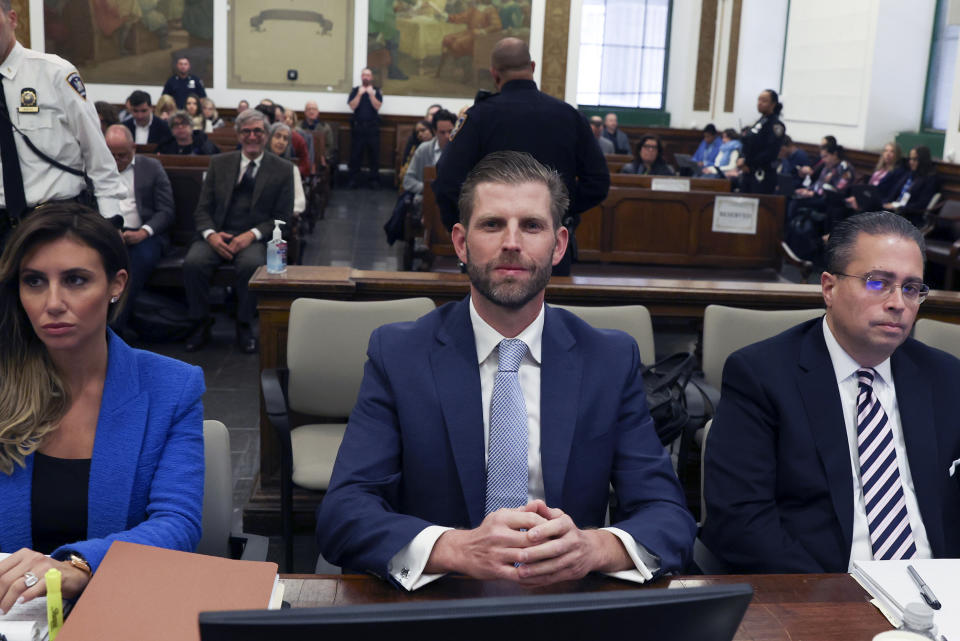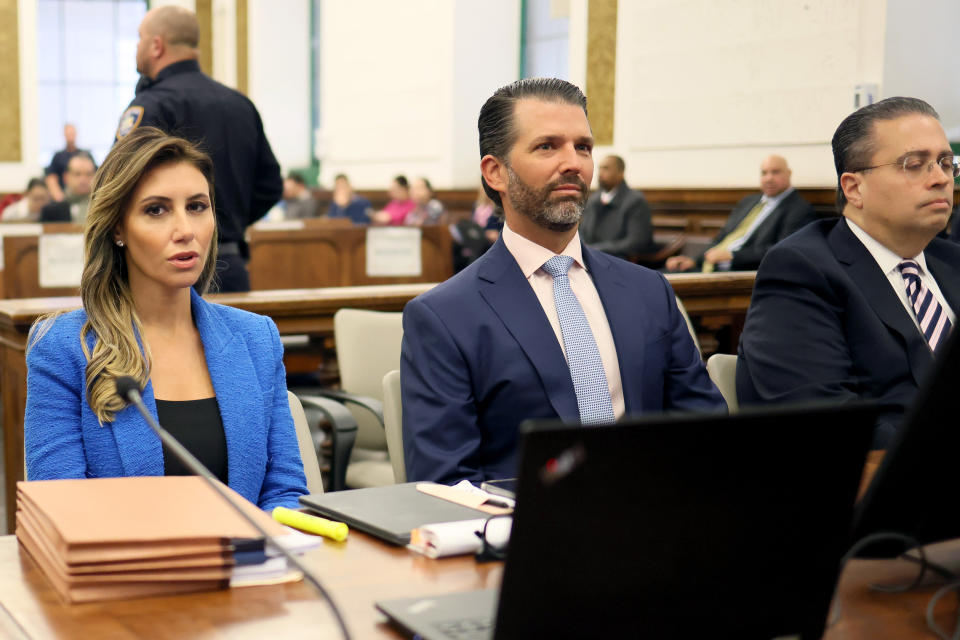Eric Trump in fraud trial says he knew nothing about financial statements, then admits he actually did
NEW YORK — Donald Trump’s eldest sons testified back to back at the family’s fraud trial in Manhattan Supreme Court on Thursday — both denying involvement in statements that exaggerated their father’s net worth by billions, despite evidence to the contrary.
Replacing his brother in the witness box shortly before noon, Eric Trump testified that he didn’t know “anything” about his dad’s financial statements until the New York attorney general brought the case on trial before saying later he “absolutely” did.
“I didn’t know anything about it until this case came into fruition,” Eric testified. “I had no involvement and never worked on my father’s statement of financial condition.”
But pressed on his knowledge of the statements’ existence about 45 minutes into his testimony, Eric lost his cool.
“We’re a major organization, a massive real estate organization. Yes, I’m fairly sure we have financial statements,” he testified, sounding sarcastic. “Absolutely.”
Eric’s denials came into question when Andrew Amer pulled up emails the state lawyer said showed ex-Trump Organization Controller Jeff McConney “expressly” informed him of the statements a decade ago when seeking figures to value Seven Springs. Eric primarily oversaw operations at Trump’s Westchester estate, where he lived for a time with his wife, Lara.
Eric didn’t deny the validity of the correspondence displayed in court.
“So, you did know about your father’s annual financial statements as of Aug. 20, 2013, didn’t you?” Amer asked.
“It appears that way, yes.”
“And he told you that he needed to value Seven Springs for that annual financial statement?”
“That’s what it says, yes.”
Judge Arthur Engoron heard from McConney at the start of the trial, who said Eric was the one who directed him to account for seven nonexistent units he planned to build but never did at Seven Springs when calculating its value, boosting its worth by a neat $161 million.
The emails featured among a wealth of correspondence Amer presented while questioning Eric that stood in contrast to his claims he wasn’t in the loop when it came to pricing properties for his dad’s statements.
Eric and Don Jr., executive vice presidents at the Trump Organization, took the helm of their father’s real estate empire in 2017 after he became president. Eric became the face of the company while Don Jr. assumed control of his father’s trust with convicted finance chief Allen Weisselberg.
Both have been found liable along with their father and Trump Organization execs Weisselberg and McConney for the AG’s top fraud claim of seven. In a pretrial ruling, Engoron determined they committed fraud by lying about the value of company assets in statements submitted to financial institutions from 2014 to 2021.
The AG’s case alleges they conspired to inflate property values — and thus Trump’s net worth — to illegally profit in deals with banks and lenders and land Trump a spot on the Forbes Rich List. An expert witness who testified Wednesday estimated banks lost more than $168 million due to the fraudulent numbers from 2014 through this year.
Trump, his children, and former executives deny all wrongdoing. Among other arguments, they’ve claimed that the value of a building is in the eye of the beholder.
Despite their senior status — which Don Jr. confirmed Wednesday was only a couple steps from the top — the Trump boys said they shouldn’t be held responsible for the validity of business records they signed off on.
Eric said historically, he’d spoken with McConney almost daily. He said it didn’t “register” with him whether the figures he provided the controller were being used for his dad’s financial statements or something else, saying it was “a detail that was irrelevant.”
“I don’t really care where it’s being used,” he testified. “I care about providing them with information from the department that I’m running.”
Asked about a much more recent call in 2021 regarding his dad’s financial statements, Eric couldn’t recall it either, telling the court he’s on “a thousand calls a day.”
Before resting their case, lawyers for the AG are expected to call Trump to the stand on Monday and his daughter, Ivanka Trump, on Nov. 8. Late Thursday, the First Department Court of Appeals shot down her motion seeking to get out of the testimony and pause the trial. Ivanka, who had cited “undue hardship” in her notice of appeal, was initially a defendant in the case but won dismissal for time-barred claims in June.
The former first daughter, who long held the same title as her brothers, left the city and the company in 2017 to serve as an unpaid presidential adviser to her father. She now lives in Florida.
Eric’s assertions mirrored those of his older brother, Don Jr., on Wednesday and throughout Thursday morning. Statements shown in court exaggerating the value of Trump assets by billions were certified as accurate by Trump’s trustees after he became president, but the eldest Trump child pinned responsibility on the company’s in-house and outside accountants.
“The accountants worked on it. That’s what we pay them to do,” Don Jr. told the court.
In the case on trial and the company’s criminal case last year, ending in its and Weisselberg’s convictions, Trump and his attorneys have sought to blame the Trump Organization’s former outside accounting firm, Mazars, and the CPA they dealt with, Donald Bender, for any inaccuracies.
Bender, who has not been accused of wrongdoing, previously testified that his job was to compile figures Trump gave him when putting together his net worth — not to ensure the information was accurate. He told Engoron, “they were not getting us all the documents.”
While the testimony from Trump’s scions was substantially similar, their demeanors were like night and day.
Unlike his brother, who was grinning ear-to-ear from the moment he arrived until he left — even cracking jokes with the judge he’s trashed on TV— a tense Eric wore his poker face to court.
Don Jr. appeared particularly concerned with how he looked.
Trump’s firstborn showed veteran courtroom artist and author Jane Rosenberg an AI photo of convicted fraudster Sam Bankman-Fried for inspiration — asking her to “make me look sexy.”
_____
_____

 Yahoo Finance
Yahoo Finance 

